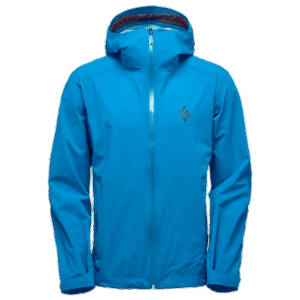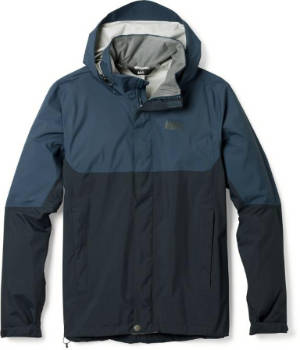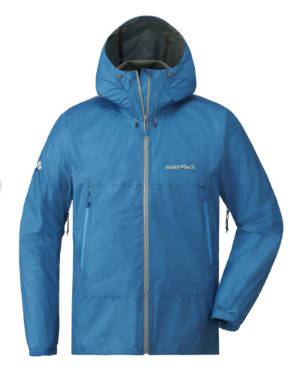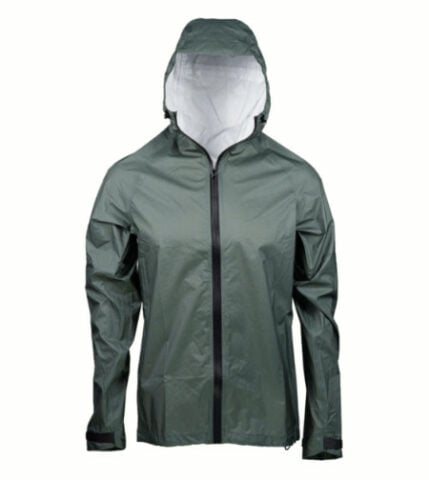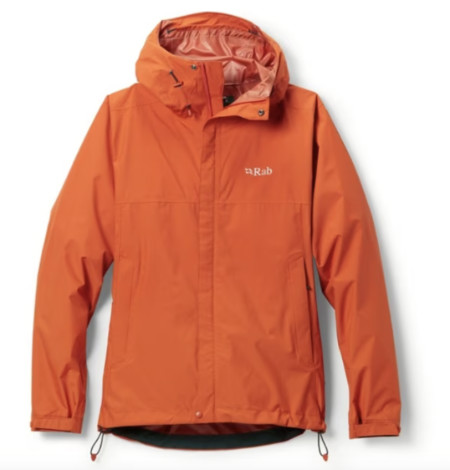What should you look for in a rain jacket for hiking and backpacking? While having a waterproof/breathable jacket can be a plus, it’s pretty easy to overwhelm their ability to vent moisture in the rain when you’re perspiring with a backpack strapped to your back. You’re really better off buying a more affordable jacket that has features that hikers need like a fully adjustable hood, pit zips, velcro wrist cuffs, and hem adjusters. Tracking down rain jackets that fit that description takes a little leg work, but we’ve done it for you below.
We’ve also included waterproof/breathable rain jackets as well as ones made with non-breathable fabrics because you’re going to perspire when you’re wearing them in the rain, no matter how much they cost or what they’re made of. If staying perspiration-free in the rain is important to you while you’re hiking down a trail carrying a loaded backpack…maybe you should pick another sport. You’re going to sweat. Think of a rain jacket as part of your larger layering system instead. Its best use is to keep you warm when it’s raining or the wind is blowing hard, often in combination with a mid or base layer. Perspiring is inevitable. Your goal should be to stay warm and avoid hypothermia.
Here are the 10 top (reasonably priced) rain jackets that we recommend for hikers and backpackers.
1. Patagonia Torrentshell 3L ($179)
2. Black Diamond Stormline Stretch Rain Shell ($180)
3. REI Rainier Rain Jacket ($100)
4. Outdoor Research Foray II ($225)
The Outdoor Research Foray II is an updated version of OR’s most popular waterproof/breathable Gore-tex rain jacket. It is loaded with features including a three-way adjustable hood with a front brim, velcro wrist cuffs, chest and hand warmer pockets, YKK Aquaguard zippers, and elastic hem adjustment. But what sets this jacket apart from all others are its full-length torso-flow side-zips which can be opened like pit-zips but extend all the way down the sides of the jacket so you can fully ventilate the jacket like a poncho and even wear it over your hip belt to keep it dry in the rain. The women’s model is called the Outdoor Research Aspire II. Read the SectionHiker Foray II Review.
5. Montbell Versalite Jacket ($249)
6. Enlightened Equipment Visp Rain Jacket ($250)
7. Marmot Precip Eco ($100)
8. Lightheart Gear Rain Jacket ($150)
9. Frogg Toggs Xtreme Lite ($60)
10. Rab Downpour Eco Rain Jacket ($140)
Backpacking Rain Jacket Selection Criteria
What are the most important features to look for on a hiking and backpacking rain jacket?
Adjustable Hoods
Unfortunately, many rain jackets have oversized hoods that are intended for skiers and climbers who wear protective helmets. What you should look for is a fully adjustable hood with a rear volume adjustment so you can shrink the hood size to fit your head, side pulls so you can adjust the size of the face opening, a wire or shapeable brim to shield your eyes from wind and snow, and a high collar that covers your neck and mouth. All of these features will help protect your face from the cold and wind and help you stay warmer.
Zippered Pockets
You can’t have too many rain jacket pockets. They’re great for carrying spare gloves, hats, and keeping navigation tools in easy reach. They’re also good for keeping snacks close at hand so you can eat while you hike. I view rain jacket pockets as an extension of my backpack because the extra storage cuts down on the number of times I have to stop to get clothes or food out of my pack.
Venting Capabilities
When you have to hike in cool wet weather, you want to limit the amount you perspire by actively managing your warmth level. The key to doing this involves venting excess warmth by removing or venting layers. A good rain jacket should provide several ways for you to dump excess heat without having to take it off completely. Here are some of the most important features to look for when comparing different jackets.
- Adjustable Hook and Loop (Velcro) Wrist Closures: This helps regulate the body heat at your wrists where the blood flows close to the surface of your skin. They can be worn under gloves or over them depending on your preference and the glove type.
- Two-way front zipper: If you pull the bottom half up, you can dump a lot of excess torso heat, poncho-style.
- Hem drawcord: Cinch it closed to keep the wind from blowing up between your legs and robbing your torso of heat.
Breathability Ratings
What should you look for in terms of breathability ratings when looking at hiking rain jackets? For inexpensive rain jackets, the best you can hope for is 10,000 (g/m^2/d) MVTR (movable water vapor transmission rate), which is pretty lackluster. Most of the manufacturers listed above don’t publish the MVTRs for their jackets, because they’re not that competitive with more expensive garments.
But to be honest, I don’t trust the breathability ratings published by manufacturers because they’re measured in ideal laboratory conditions that have little to do with actual use. Pit zips and active venting trump breathability claims any day. If you get too hot, venting your rain jacket is going to cool and dry you off far more quickly than waiting for water vapor to move across a breathable membrane while your zipper is closed.
Check Out All of SectionHiker’s Gear Guides!
SectionHiker is reader-supported. We only make money if you purchase a product through our affiliate links. Help us continue to test and write unsponsored and independent gear reviews, beginner FAQs, and free hiking guides.


